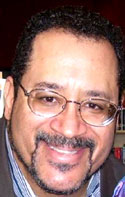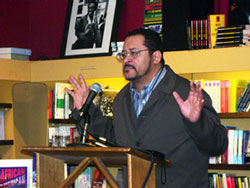FCNNEWSSOURCE

Author, educator and lecturer Dr. Michael Eric Dyson’s latest work, “Debating Race with Michael Eric Dyson,” is, among other things, a compilation of his previously unpublished encounters with influential thinkers and politicians.
After an intimate talk and book signing Mar. 3 at Eso Won Books in Los Angeles, Dr. Dyson afforded Final Call Staff Writer Charlene Muhammad a moment of insight into his participation in the recent Nation of Islam Saviours’ Day 2007 Convention in Detroit, Mich., and the impact of the Hon. Min. Louis Farrakhan’s words of guidance and warning.
FINAL CALL (FC): What was your involvement in Saviours’ Day?

Dr. Michael Eric Dyson (MD): Min. Farrakhan invited me to come and participate in that weekend. I have loved him so much and wanted to support his final public statement so greatly that I cancelled an appearance at Howard University that morning, where I was supposed to preach, and where I have been preaching for the past six to seven years. I, instead, went to stand by the Minister’s side in Detroit to hear his thrilling “One Nation, Under God” message. My participation is an extension of my love and appreciation for Min. Farrakhan and the great work he’s doing to bring solidarity and incredible love to Black America.
FC: Give your thoughts on seeing and hearing Min. Farrakhan after his recovery.
MD: Well, there’s no question that all of us were praying for his recovery, and the fact that he came back to deliver this powerful and incredibly moving speech and sermon and religious address is a testament to his strong determination to allow his people to hear from one of their great leaders and for his investment in us as a people. His belief is unwithering; his commitment is unchallengeable; and his thirst for Black love is un-quenchable. That’s what came across so very powerfully, even though he has obviously struggled with his health, the inner beauty and the shine were there in extraordinary fashion.
FC: What about the timing of Min. Farrakhan’s address, when there are so many crisis in the world and when Blacks, in particular, appear to be going backwards?
MD: It’s important for his message even more to come forward, because a man like Min. Farrakhan is clear and lucid and articulate about the fundamental issues of White supremacy and social injustice and inequality with which Black people are faced and that they confront. So his voice is powerful. His presence is luminous and his vision is clear. And of course controversy as well as adversity may clarify for one what one truly believes, and Min. Farrakhan has endured both of them and has come through with a vision of unity and of the forging connection between peoples from different communities, as well as telling the truth about American empire and the degree to which we have to get rid of the White supremacists social injustice economic inequality that prevails in this culture in order for people to enjoy a decent way of life; so his voice is ever more needed that it has ever been.
FC: What do you see as the impact of the Saviours’ Day convention on those who are not “followers” of Min. Farrakhan and the Most Hon. Elijah Muhammad?

MD: Well, many of us who stand outside the official ranks of the Nation of Islam find the message powerful: The love of Black people, the notion of self-help, the belief that we can do for ourselves and the conviction that we should stay on our jobs of wrestling with these demons and devils of inequality and injustice that prevail–that’s extraordinary, and I think Min. Farrakhan has been a leader in that.
He has been unparalleled in this generation of telling the truth about Black suffering and Black pain and Black want, and fighting against the vicious premises of White supremacy by refusing to call it anything but what it is. So, in that sense, those of us who are not in the Nation officially, are fellow travelers with the Minister as he fights against these tremendous odds, and we see him as a grand leader in a great tradition of Marcus Garvey, Elijah Muhammad, Min. Malcolm X and other Black nationalists leaders who have expressed the greatest value for Black life in this country.
FC: Of the many issues Min. Farrakhan addressed, what stands out most to you?
MD: It was the notion of unity and the notion of love and transcending. I was very struck when Min. Farrakhan said if Jesus and Muhammad were here today, they’d be embracing each other. That’s a tremendous message that needs to be heard more broadly. In American culture, where there’s so much division and divisiveness, where there’s so much hatred and extraordinary disregard for the lives of everyday, ordinary people, that message needs to be heard and Min. Farrakhan is a man who delivered it with power.
When he stood there, on that stage, suggesting that we should come together, whether we’re Latino or Native American or first nation, Indigenous people or African Americans and the like; whether we’re from the Caribbean or Africa or from America itself, that we should come together, that’s a strong message of not fictional unity, but functional solidarity and I think that’s a beautiful thing.
FC: Thank you.












